Most people are prepared to deal with common everyday first aid needs. Medicine cabinets contain the basic medicines you’ll need to treat everyday illnesses, or at least keep you limping along until you can get to medical attention. What happens when that medical attention is a long way off, and you’re involved in a prolonged emergency without medical care?
Are you prepared to handle an extended period without access to medical care, possibly for months or years? In such a situation, the ability to treat and prevent chronic illness may literally mean the difference between life and death.
Researchers in the UK now estimate that roughly half of the population will be diagnosed with some form of cancer in their lifetime. That’s up from 1 in 3 people even just a few decades ago. In a survival scenario, that number could increase further as the potential for increased environmental toxins is higher without sanitation or rule of law.
But… How Do You Prepare to Treat Cancer?
In times of chaos, when modern medicine is not available, we have to go back to our roots and use time-tested medicines that worked for our ancestors. Plant based medicine worked to keep us healthy for generations, and now science is showing us why.
Consuming ginger extract has been shown to have significant anti-cancer properties according to a study in the journal of food and chemical toxicology. In particular, ginger is effective at preventing the growth and progression of prostate, ovarian and colon cancer in lab studies. Ginger extract is also showing promise as a treatment for liver cancer.
One study in the British Journal of Nutrition found that consuming 100 mg of ginger for every Kg of body weight could inhibit the growth of prostate cancer by as much as 56%.
Related: 10 Health Benefits of Cinnamon That Surprised Even Us
Ginger is extremely easy to grow at home as a houseplant, because it thrives in low light. Full sun outdoors actually burns the growth, meaning that it’s ideal to cultivate on a windowsill indoors for year round harvests. So long as temperatures consistently stay above 50 degrees, you can have your own self renewing supply of cancer fighting ginger.
How To Easily Prepare Your Own Homemade Ginger Extract
All you need is a bit of ginger, a neutral cooking oil, such as olive or sunflower oil, and a bit of heat for the extraction process.
#1. Wash it off
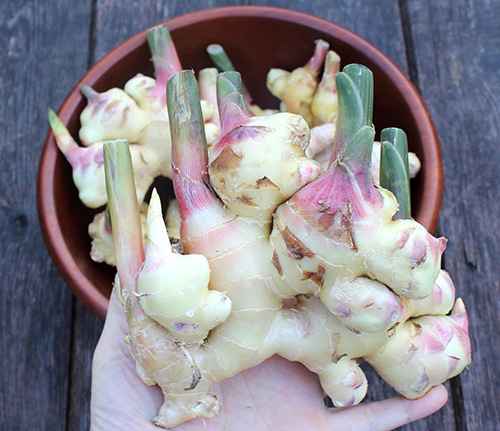
Start by thoroughly washing and drying your ginger root. Allow the root to dry for at least a few hours or overnight to ensure it’s completely dry before you begin. Grate or thinly slice the ginger into a heat safe container, such as a small baking pan, enameled cast iron or mason jar. I’ve used an enameled cast iron because it allows me to make small batches, and cover a single layer of ginger with just a think layer of oil. The cast iron helps to moderate the heat, and keep the ginger extracting at a constant low temperature.
#2. Peel and grate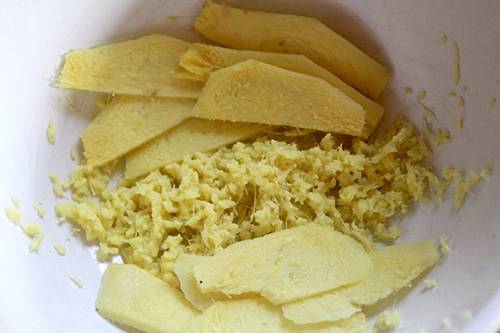
Peeling the ginger first helps it taste better, but it’s not necessary as the peel also contains medicinal compounds. In a survival situation, I would want to make use of every scrap of ginger, and I wouldn’t waste the peel.
#3. Cover with oil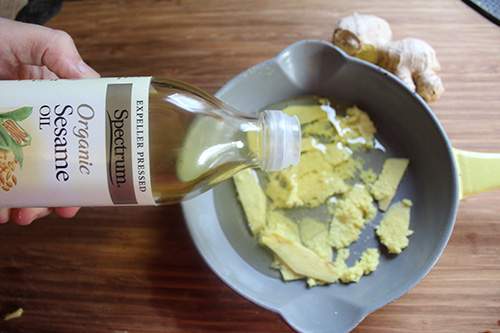
Cover the ginger completely with your neutral cooking oil. In this case, I’ve used sesame oil because I want to incorporate the ginger oil into my cooking and sauces, and the flavor of sesame complements ginger. Sesame oil also has its own cancer fighting properties, and is showing promise as a treatment for colon cancer.
#4. Extract the essentials
Place the heat-safe container in the oven on its lowest setting, usually around 150 to 170 degrees. Extract the oil for 2 to 4 hours.
In a pinch, placing your extract near the wood stove also works to provide heat, but avoid placing it in direct contact with the stove as that will deep fry your oil rather than gently extract.
Related: How To Make a Powerful Calendula Extract to Keep in Your Medicine Cabinet (with pictures)
The heat will help draw medicinal compounds out of the ginger and into the oil, while at the same time driving off excess water that could cause the oil to go rancid.
#5. Strain and store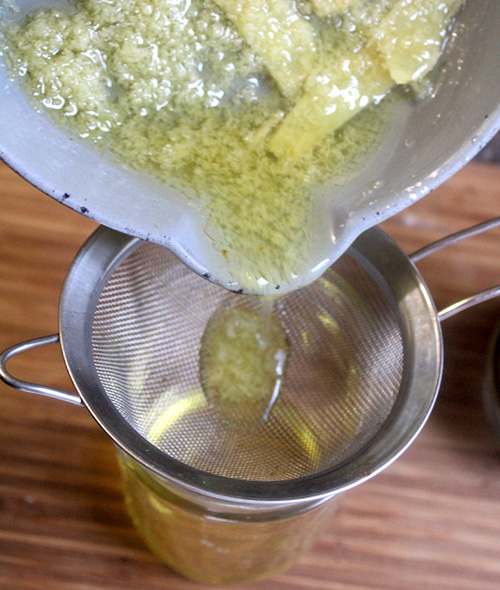
After your extraction is complete, strain out the ginger solids using cheesecloth, muslin or a fine mesh strainer. Ginger oil should store out of direct sunlight for at least 6 months. Home grown ginger, harvested twice per year, should keep your family stocked with this homemade cancer preventative and treatment all year long.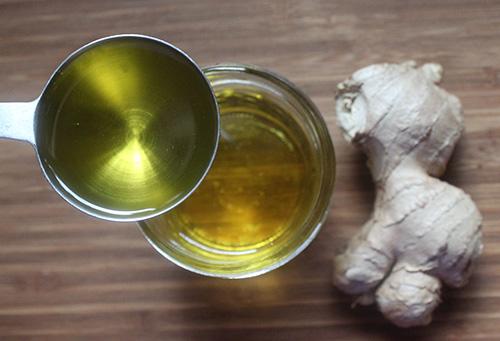
As with most herbal treatments, it’s best to consume it daily in small quantities as a preventative rather than trying to consume it in large quantities after a condition has already developed. Fortunately, ginger also has a host of other health benefits all year long even before you’re dealing with a cancer diagnosis. It’s a potent anti-inflammatory, and it also helps with digestion, circulation, headaches. coughs, colds, and fungal infections.
Try incorporating ginger oil into your cooking, or simply take it by the spoonful daily.
You may also like:
 The Most Powerful Natural Antibiotics Known to Mankind
The Most Powerful Natural Antibiotics Known to Mankind
Cheap and Easy to Built Root Cellar in Your Own Backyard (video)

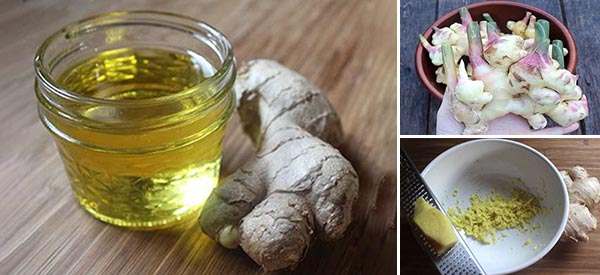




















The dosage is listed in milligrams. The oil is liquid so what is the millilitre measure? Also do you have an acurate ginger to oil ratio?
Quote from a conversion website: Milligrams (mg) measure weight, and Millilitres (ml) measure volume of liquid.
The part of the word ‘Milli’ comes from the latin mille, which means one thousand. There are 1,000 milligrams in a gram, and 1,000 millilitres in a litre of liquid.
What are the ratios ginger to oil? Can this be done in a slow cooker on low?
How do you consume it, a spoon full at a time or do you add it to food,
I use a tbsp in my hot tea every morning…He tecommends using a little each day so thats my solution…Overdoing anything is usually not tecommended anyway..JMO of course
I like this, anybody have any recipes? Wonder if it can take much heat, or is it best used as a sauce or dressing ingredient? Ginger is a very handsome plant.
https://drericz.com/cooking-with-essential-oils/
good info but no recipes…
I have wild ginger in my woods. Does it work the same way?
Did someone click the wrong thumb? Why would someone give a thumbs down to a cogent question? Nick: If you read this, I think your question is right on and if the downer really meant to click a thumbs down, I wonder about their mindset.
To answer your question, I am not a botanist by any stretch of the imagination, but I think domestic ginger probably originated from wild ginger way back when. While I can’t state it as a positive statement, it is my belief that in Korea and Japan where harvesting wild plants is a big pastime — just saw a 45 minute program on harvesting wild mushrooms in Japan, something I would never attempt here in the States — harvesting wild ginger is very common. It is also my vague recollection that Korean ginger is supposed to be the best ginger. Don’t know where I picked up that bon mot, If you are concerned about consuming wild ginger, approach it with the U.S. Army method of testing. Rub it on your elbow. No reaction in 24 hours, rub it on your lip. No reaction in 24 hours, chew a small bit but don’t swallow. That will clear your sinuses, No reaction other than very clear sinuses in 24 hours, consume a small bit. If you haven’t died, you probably can consume the plant but go easy the first few portions. Don’t gobble up the entire root. You probably wouldn’t want to anyway, but that also applies to other plants.
Ginger Root and Honey: He Cured Himself From The Most Dangerous Type Of Cancer And Left The Doctor Shocked –
This story was published in eastern europe and africa but never published in western media. 13 years ago, a man from Zagreb, called Ante Kresic, was told he had one of the deadliest cancers, lung cancer. Moreover, he was informed that he won’t live much longer.
Yet, he is perfectly healthy man today, due to his natural cancer treatment with honey and natural herbs. He defeated lung cancer and now he keeps bees.
He was released from the hospital in April and he decided to try the honey/ginger treatment. After several months he went for a regular check-up in the hospital in Zagreb, and the doctors were shocked because he was still alive.
Hence, they advised him to proceed with consuming his homemade remedies and therapies. In summer, his disease was gone. When he had his blood checked, there was no sign that he has ever been ill.
Afterwards, Kresic decided to share his experience in order to help people with similar problems like his one.
The stories of Kresic and people like him serve as evidence that honey mixed with other natural spices as ginger, pine needles and other herbs can defeat cancer.
A woman from Bosnia also succeeded in defeating cancer with a mixture prepared from honey and ginger. She recommends that the honey used should be homemade, or bought from reliable beekeepers. She also shared her recipe, hoping to be able to help others.
Recipe:
Chop two big ginger roots and mix them with (18 oz ) ½ kg of organic honey in a mason jar.
Put the mixture in a glass jar and consume 1 tablespoon (use wooden or plastic spoon) 3-4 times a day. The first effects will be achieved in 4 days.
Remember to keep positive and never give up the struggle for your health, regardless of the doctors’ predictions, for that is the first step to your improvement.
The conventional cancer treatments include chemotherapy as an only way to fight this disease, but unfortunately, it harms the body even more than the cancer itself.
That is the reason why cancer patients turn to natural medicine, seeking for a safer way to treat cancer. Namely, a great number of people have succeeded in defeating this deadly disease with homemade remedies and natural herbs.
Some of them used carrots, others cannabis or turmeric and baking soda, but the newest remedy is honey.
Honey has been considered to be a holy food for centuries, since it is one of the most important natural remedies known to men. Throughout the history, it was constantly used due to its numerous health benefits, mostly by wealthy people as it was quite expensive.
Explorers discovered bowels with honey in Tutankhamen’s Tomb which is over 3000 years old. Romans and Greeks used the honey to strengthen the body and to heal wounds.
Studies have shown that a daily dose of raw honey raises levels of health-promoting antioxidants in the body. Antioxidants help block free radicals in the body that cause disease. It also boosts the immune system, acting as a preventative against any number of diseases. Honey contains polyphenols, which are powerful antioxidants that have been shown to reduce the risk of heart disease and cancer. Honey As Natural Cancer “Vaccine”. https://www.ncbi.nlm.nih.gov/pmc/articles/PMC3385631/
Ginger and its constituents have been shown to inhibit the following cancers: https://www.cancertutor.com/ginger-fighting-cancer/
• Breast cancer
• Colon and rectal cancer
• Leukemia
• Liver cancer
• Lung cancer
• Melanoma
• Ovarian
• Pancreatic cancer
• Prostate cancer
• Skin cancer
• Stomach cancer
Ginger Root Kills 76% of Lung Cancer Cells in Vivo: For the first time ever, researchers have discovered that not only is ginger extract extremely toxic to lung cancer cells, but it’s metabolites (break-down products) are even more toxic! They observed that 6-Gingerol, a major anti-cancer compound of ginger, was metabolized into 6-gingerdiol inside the cancer cells, and that this metabolite killed up to 76% of the lung cancer cells. Ginger extracts have already shown potent activity against prostate cancer, pancreatic cancer, breast cancer, colon cancer and leukemia in previous lab studies, and this latest research has shed new light on exactly how ginger kills these cancer cells. And this super-herb’s health benefits extend beyond cancer. A recent clinical trial showed ginger improved insulin sensitivity and lowered insulin levels in adults with diabetes. And another study on middle aged women showed ginger to significantly improve memory and cognitive performance! Ginger tastes great in stir fries, curries, chutney, salad, with fish, baked in cookies or cake. Or simply steep freshly chopped ginger in boiled water for a few minutes for a delicious tea (great sweetened with honey or stevia), and be sure to eat the slices too (which are rather spicy) for maximum benefit.
Ginger Reduces Lung Tumors 59% in Vivo: Researches have just discovered that ginger fights lung cancer by reducing the tumor’s ability to produce a key compound called CCL2 which allows cancer cells to spread and most importantly, hide from the immune system. The researchers found that 6-Shogaol, found abundantly in ginger, was so effective at decreasing CCL levels that treated mice had 59% fewer lung tumors, and the cancer cells’ ability to invade surrounding tissue was reduced by 43%, while ability to migrate (spread) was reduced by 56%. Ginger extracts have already shown potent activity against prostate cancer, pancreatic cancer, lung cancer, colon cancer and leukemia in previous lab studies, and this latest research adds an exciting new science behind the importance of ginger in the fight against cancer. And this super-herb’s health benefits extend beyond cancer. A recent clinical trial showed ginger improved insulin sensitivity and lowered insulin levels in adults with diabetes. And another study on middle aged women showed ginger to significantly improve memory and cognitive performance! Ginger tastes great in stir fries, curries, chutney, salad, with fish, baked in cookies or cake. Or simply steep freshly chopped ginger in boiled water for a few minutes for a delicious tea (great sweetened with honey or stevia), and be sure to eat the slices too (which are rather spicy) for maximum benefit. http://www.ncbi.nlm.nih.gov/pubmed/23066935
Ginger Root contains a pungent compound that could be up to 10,000 times more effective than conventional chemotherapy in targeting the cancer stem cells at the root of cancer malignancy.
Numerous studies are confirming that ginger extract has anti-metastatic properties that inhibit many types of cancer, including breast, colon, rectal, liver, lung, prostate, pancreatic, and melanoma.
https://www.ncbi.nlm.nih.gov/pmc/articles/PMC3426621/
http://www.medicalnewstoday.com/articles/41747.php
https://www.ncbi.nlm.nih.gov/pmc/articles/PMC2241638/
Your report states that Ante Kresic used ginger and honey. WRONG! He used honey and pine needles, not ginger.
Cancer Compass an Alternate Route